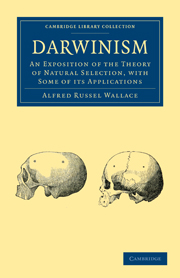Book contents
- Frontmatter
- Preface
- Contents
- LIST OF ILLUSTRATIONS
- CHAPTER I WHAT ARE “SPECIES” AND WHAT IS MEANT BY THEIR “ORIGIN”
- CHAPTER II THE STRUGGLE FOR EXISTENCE
- CHAPTER III THE VARIABILITY OF SPECIES IN A STATE OF NATURE
- CHAPTER IV VARIATION OF DOMESTICATED ANIMALS AND CULTIVATED PLANTS
- CHAPTER V NATURAL SELECTION BY VARIATION AND SURVIVAL OF THE FITTEST
- CHAPTER VI DIFFICULTIES AND OBJECTIONS
- CHAPTER VII ON THE INFERTILITY OF CROSSES BETWEEN DISTINCT SPECIES AND THE USUAL STERILITY OF THEIR HYBRID OFFSPRING
- CHAPTER VIII THE ORIGIN AND USES OF COLOUR IN ANIMALS
- CHAPTER IX WARNING COLORATION AND MIMICRY
- CHAPTER X COLOURS AND ORNAMENTS CHARACTERISTIC OF SEX
- CHAPTER XI THE SPECIAL COLOURS OF PLANTS: THEIR ORIGIN AND PURPOSE
- CHAPTER XII THE GEOGRAPHICAL DISTRIBUTION OF ORGANISMS
- CHAPTER XIII THE GEOLOGICAL EVIDENCES OF EVOLUTION
- CHAPTER XIV FUNDAMENTAL PROBLEMS IN RELATION TO VARIATION AND HEREDITY
- CHAPTER XV DARWINISM APPLIED TO MAN
- INDEX
CHAPTER VI - DIFFICULTIES AND OBJECTIONS
Published online by Cambridge University Press: 29 August 2010
- Frontmatter
- Preface
- Contents
- LIST OF ILLUSTRATIONS
- CHAPTER I WHAT ARE “SPECIES” AND WHAT IS MEANT BY THEIR “ORIGIN”
- CHAPTER II THE STRUGGLE FOR EXISTENCE
- CHAPTER III THE VARIABILITY OF SPECIES IN A STATE OF NATURE
- CHAPTER IV VARIATION OF DOMESTICATED ANIMALS AND CULTIVATED PLANTS
- CHAPTER V NATURAL SELECTION BY VARIATION AND SURVIVAL OF THE FITTEST
- CHAPTER VI DIFFICULTIES AND OBJECTIONS
- CHAPTER VII ON THE INFERTILITY OF CROSSES BETWEEN DISTINCT SPECIES AND THE USUAL STERILITY OF THEIR HYBRID OFFSPRING
- CHAPTER VIII THE ORIGIN AND USES OF COLOUR IN ANIMALS
- CHAPTER IX WARNING COLORATION AND MIMICRY
- CHAPTER X COLOURS AND ORNAMENTS CHARACTERISTIC OF SEX
- CHAPTER XI THE SPECIAL COLOURS OF PLANTS: THEIR ORIGIN AND PURPOSE
- CHAPTER XII THE GEOGRAPHICAL DISTRIBUTION OF ORGANISMS
- CHAPTER XIII THE GEOLOGICAL EVIDENCES OF EVOLUTION
- CHAPTER XIV FUNDAMENTAL PROBLEMS IN RELATION TO VARIATION AND HEREDITY
- CHAPTER XV DARWINISM APPLIED TO MAN
- INDEX
Summary
In the present chapter I propose to discuss the more obvious and often repeated objections to Darwin's theory, and to show how far they affect its character as a true and sufficient explanation of the origin of species. The more recondite difficulties, affecting such fundamental questions as the causes and laws of variability, will be left for a future chapter, after we have become better acquainted with the applications of the theory to the more important adaptations and correlations of animal and plant life.
One of the earliest and most often repeated objections was, that it was difficult “to imagine a reason why variations tending in an infinitesimal degree in any special direction should be preserved,” or to believe that the complex adaptation of living organisms could have been produced “by infinitesimal beginnings.” Now this term “infinitesimal,” used by a well-known early critic of the Origin of Species, was never made use of by Darwin himself, who spoke only of variations being “slight,” and of the “small amount” of the variations that might be selected. Even in using these terms he undoubtedly afforded grounds for the objection above made, that such small and slight variations could be of no real use, and would not determine the survival of the individuals possessing them. We have seen, however, in our third chapter, that even Darwin's terms were hardly justified; and that the variability of many important species is of considerable amount, and may very often be properly described as large.
Information
- Type
- Chapter
- Information
- DarwinismAn Exposition of the Theory of Natural Selection, with some of its Applications, pp. 126 - 151Publisher: Cambridge University PressPrint publication year: 2009First published in: 1889
